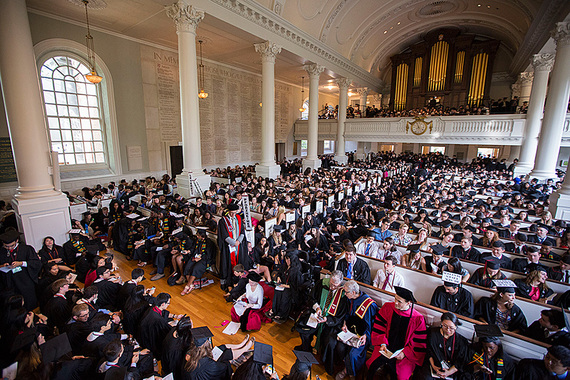"A College of Divines"
Address to the Class of 2016 in Harvard College
at Senior Chapel on the morning of Commencement
Like it or not, here you are!
I don't actually mean so much the verge of ceremonially attaining your degrees - let's presume you like that fine.
No, I mean that what you are doing this morning - right here, right now - is taking part in the very last surviving vestige of mandatory morning chapel at Harvard University.
Actually, I suspect this service persists mostly as a way of organizing you before you tumble out into the Yard.
But, nonetheless - whether to your delight, bemusement, indifference, or dismay - you find yourselves corralled this morning into a sacred space.
So let us take a few moments to reflect accordingly.
And so, accordingly, in the spirit of the buoyant, not to say bibulous rapture of this empyrean day, let me bid you turn your gazes up - up, up, up along the columns in this soaring nave of sober Harvard's Memorial Church, right up to their capitals, where you will find (stay calm, I reassure you, you are not hallucinating), at the top of every other pillar: the face of a lion and the face of an ox, the face of an eagle, and the face of a human being.
The alternating columns have rams at the top, but that's another story.
What you are looking up at there (in appropriately boggled perplexity) is an architectural attempt to render just one part of the biblical prophet Ezekiel's heavenly vision. It later becomes a Christian way of alluding to the four Gospel Evangelists, but that's again another story.
And, whether or not any of these scriptural stories has anything to do with your own heritage and outlook, let's go along for a moment with the spirit of the vision. Let's appreciate how what Ezekiel was telling us is that, for a moment - at a very specific time, and in a very particular place - he had the experience of beholding a wondrous and complicated realm that defied utterly the boundaries and conventions and definitions and limitations of his prior human perspective.
Sound familiar?
And what does Ezekiel do? Well, quite understandably he falls flat on his face. He prostrates himself before the grandeur of it all - before a vision of creatures with four different faces looking out in all directions, and "wheels" spinning "inside wheels," with "eyes all round about them" and "the appearance of torches" and "electrum" and "the likeness of terrible ice," and the "likeness of the rainbow," and the multi-winged, multi-faceted "living beings rushing back and forth as flashes of lightning" and the noise "like the sound of many waters," "like the tumult of an army," "like the voice of the Almighty..."
Is it any wonder that our friend Ezekiel does a very devout face-plant?
'There is too much here,' he seems to say, 'for me to handle. 'I may not even survive what I have already taken in' - so down on his face he goes, certain that his own limited aspect is entirely out of place.
But then Ezekiel hears a clear imperative - the Divine Voice - and that voice says to him, "Child of Adam - human being - stand up!"
If this is "How I Became a Prophet," by Ezekiel, it is the story of perceiving, in an otherworldly sanctum of ultimate Oneness, a complexity and multiplicity beyond the capacity of any single human mind to comprehend. And, instead of falling mute, and falling inactive with a sense of abject insufficiency, it is instead the story of daring to answer a call to stand on one's feet and become the messenger of what one has perceived - even if it defies expression infinitely.
I don't think you need to consider yourself religious to relate.
Albeit... in 1707, when John Leverett became the leading candidate for ascension to Harvard's Presidency, Cotton Mather railed, "To make a lawyer, and one who never affected the study of divinity, a president for a College of Divines will be a very preposterous thing, a thing without precedent."
As it turned out, Harvard survived, Harvard evolved.
The number of Commencers entering the ministry did diminish, sharply and steadily - so that Leverett discontinued the custom of referring to graduating seniors in the College as 'Sons of the Prophets.' Thenceforward, you were to be known (only slightly less grandly) as 'Sons of Harvard."
'Sons,' too, eventually fell by the wayside as a generality. And here, in this sacred space, we are.
And if you remember just one thing from Senior Chapel on the morning of your Harvard Commencement, beyond the beautiful music - and beyond 'This crazy Rabbi told us to look at the tops of the pillars in a church' (which is not bad as a mnemonic) - remember this:
You have beheld a universe of wondrous complexity and amazing possibility in this University - and now it is for you to share with the wider world some scintilla of what you have seen and imagined and created here. Be strong and of good courage. Humility and reverence have their place, but, on the verge of a world so very much in need, if there is a proper prayer for you in this moment, it is that you will dare to be upstanding, so that you can be generous and courageous in imparting, far and wide, something of your vision from this place.
So now, Daughters and Sons of Harvard - Children and Inheritors of the Prophets - as you are able - stand up!
(The Congregation rises for the singing of Fair Harvard)

